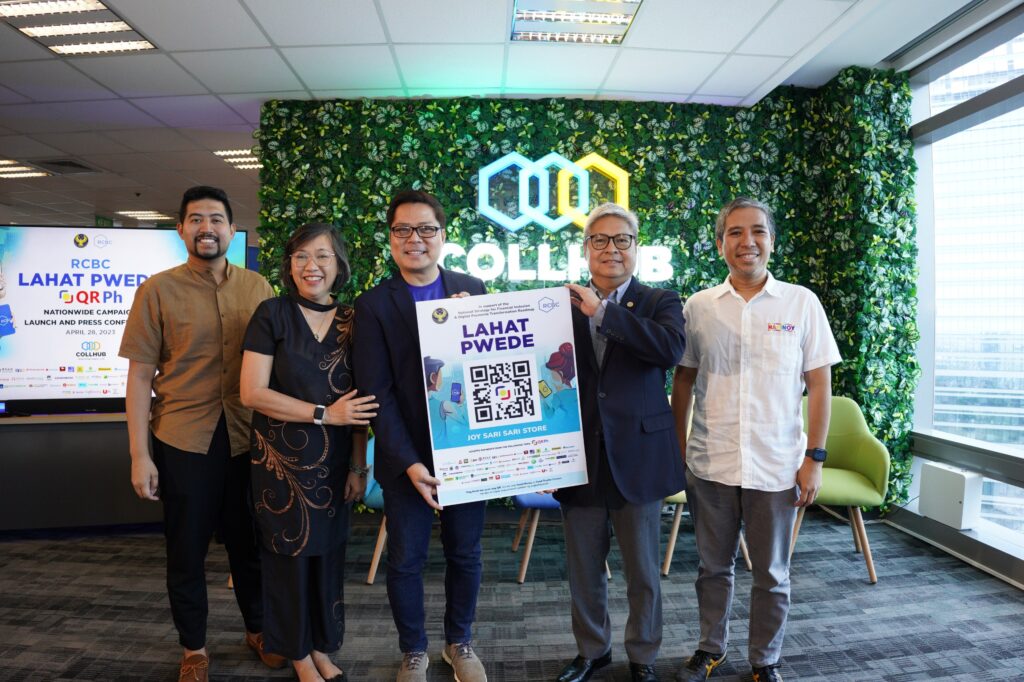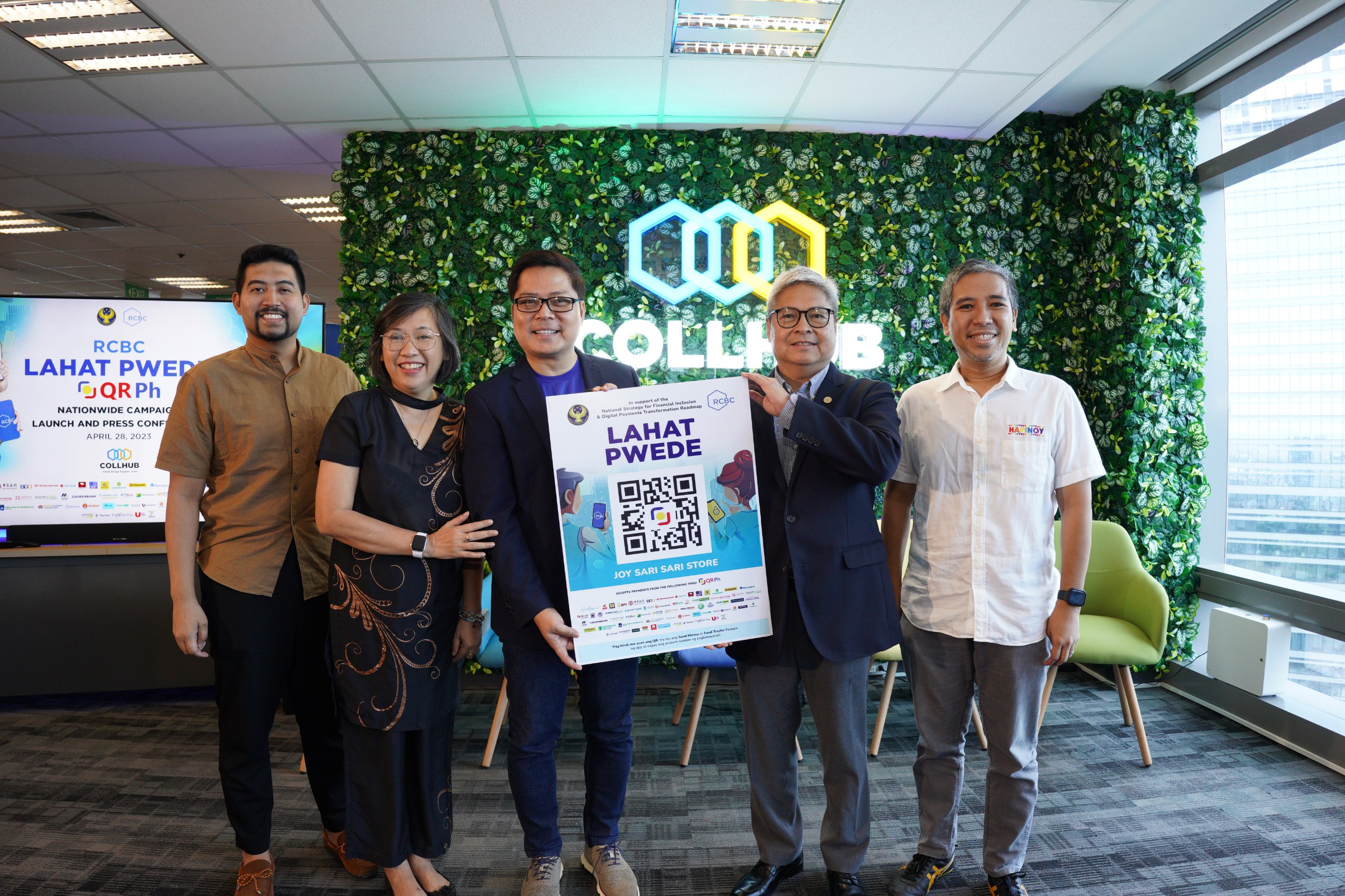By INQUIRER.net BrandRoom
Undisputed and multi-awarded challenger bank, Rizal Commercial Banking Corporation (RCBC), launched the RCBC Lahat Pwede QR Ph nationwide campaign to encourage more Filipinos to adopt digital payments through the use of the QR Ph code in a press conference attended by RCBC’s partners from the public and private sectors.

Led by RCBC Executive Vice President and Chief Innovation and Inclusion Officer Lito Villanueva, the campaign kicked off in a program graced by digital payments advocates – Bangko Sentral ng Pilipinas (BSP) Deputy Governor for Payments and Currency Management Sector Mamerto Tangonan; Department of Trade and Industry Digital Philippines and E-Commerce Lead, Assistant Secretary Mary Jean Pacheco; Hapinoy President Mark Ruiz; and Growsari President Reymund Erwin Rollan. In attendance also were representatives from the small retailers and transport sectors, and social media key opinion leaders (KOLs) who are also entrepreneurs.
RCBC is an active partner of Bangko ng Sentral Pilipinas in promoting QR Ph, the Philippines’ QR code standard based on the global EMV standard for secure payments. QR Ph allows customers of participating banks and non-bank electronic money issuers (EMIs) to easily and safely transfer funds to other bank and e-money accounts. The BSP launched QR Ph in 2019 and scaled it during the COVID-19 pandemic as part of the government’s strategy for financial inclusion and digital payments.
Villanueva said, “RCBC is committed to help realize a financially-inclusive nation for all Filipinos through initiatives that support the government’s impact programs.” He also highlighted RCBC’s digitization campaign: “The future is here-a digital forward, cash-lite, financially-inclusive society where we eliminate barriers to digital finance, lahat pwede.”
In his keynote speech, BSP Deputy Governor Mamerto Tangonan discussed the common goals of the FinTech and banking sectors, and shared BSP’s journey to accelerate digital banking in the Philippines. He also highlighted a recent survey that revealed a shift in Filipino consumers’ preference from cash to digital payments.
Tangonan urged consumers and merchants alike to take advantage of digital payments. He emphasized the importance of catering to customers’ preferences, stating, “What if your customer prefers to pay through digital? If you want to capture those sales, you have to enable your customers to pay you digitally.” The BSP Deputy Governor also encouraged all Filipinos to “help spread the news that through QR Ph, Lahat Pwede.”
Asec. Pacheco reaffirmed DTI’s support for the BSP’s digitalization campaign. In the panel discussion, Pacheco said, “We are very supportive of the digital payments transformation roadmap. It’s a shared vision. We want more Filipinos buying and paying online.”
Growsari President, ER Rollan, expounded on the benefits of a unified QR code system for sari-sari stores, while Hapinoy President Mark Ruiz expressed confidence in digitalization’s sustainability even in the post-pandemic landscape.
RCBC DiskarTech’s NegosyanTech users, composed of sari-sari store owners and tricycle drivers, also graced the event and shared the benefits of using the bank’s multi-awarded digital services.
Villanueva also highlighted the various collaborative digital initiatives that RCBC rolled out with its wide network of partners in the government and the private sector by welcoming all guests to the inaugural of the bank’s ‘CollHub’, named after the Collaboration Hub, a space created by RCBC as a platform to exchange ideas, share expertise, and foster a community of innovators.
The BSP launched the National Strategy for Financial Inclusion and Digital Payments Transformation Roadmap in 2019 to onboard more Filipinos into the formal banking system. RCBC heeded BSP’s call by launching the mass affluent app RCBC Digital, the first Taglish and Cebuano financial inclusion app RCBC
DiskarTech, and neighborhood ATM service ATM Go. RCBC’s multi-awarded digital services have also complemented the national government’s financial inclusion initiatives such the PalengQR Ph Plus program which seeks to onboard mSMEs, market vendors, and tricycle drivers into the interoperable QR Ph digital payments network. RCBC has also collaborated with Local Government Units (LGUs) in further promoting digital payments through QR Ph with the launch of the Iloilo City Pay and Bacolod City Pay QR Ph recently.
See full post here.

